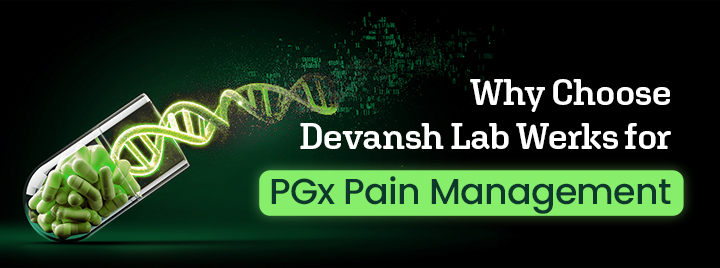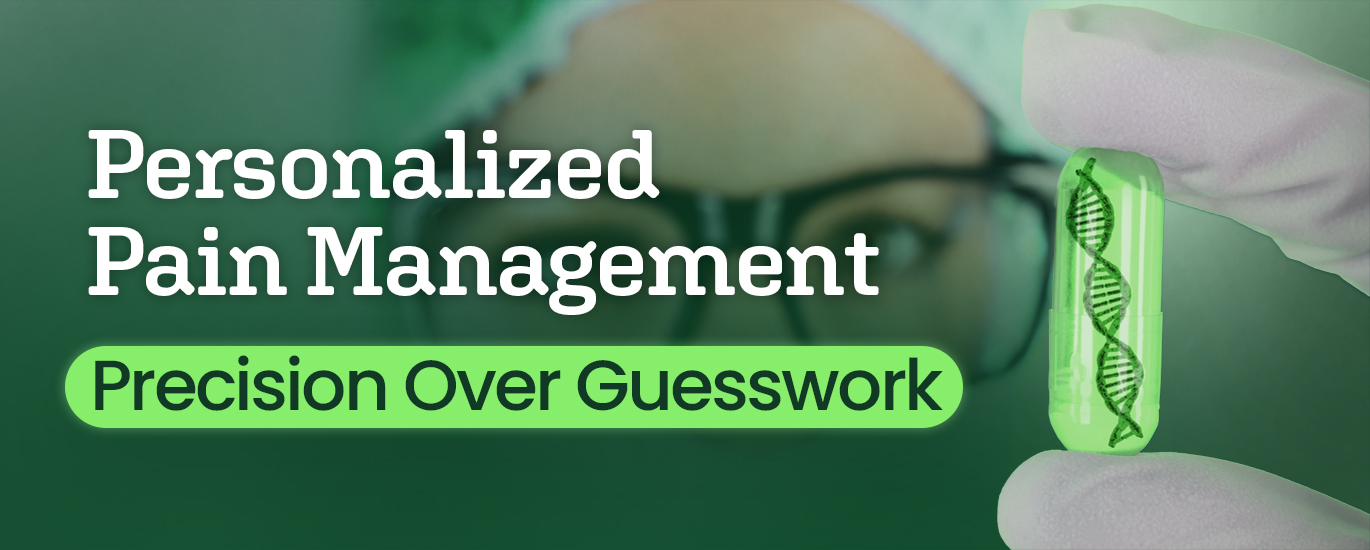When you’re in pain, finding the right medication and dose shouldn’t be a matter of trial and error. Yet for decades, opioid prescribing has been just that, guesswork based on population averages rather than your unique biology. Pharmacogenomics pain management changes that. By analyzing your DNA, healthcare providers can predict how your body will respond to specific pain medications, ensuring safer, more effective relief.
This blog explores how DNA guided prescribing through PGx opioid dosing works, why it matters in pain care, and how the Devansh Lab Werks PGx program can transform your treatment plan.
Understanding Pharmacogenomics in Pain Care
Pharmacogenomics (PGx) is the science of how your genetic makeup influences your response to medications. For pain management, PGx testing focuses on genes that control how your body processes opioids and other pain relievers.
How Your Genes Affect Pain Medication Response
Enzymes in your liver, controlled by specific genes, are responsible for breaking down opioids. Some people metabolize these drugs too quickly, while others break them down too slowly. This can lead to:
- Too Fast Metabolism: Increased risk of overdose and side effects.
- Too Slow Metabolism: Reduced effectiveness, leaving pain untreated.
Why Traditional Opioid Prescribing Falls Short
For decades, opioid dosing has followed a “one-size-fits-all” model based on clinical averages. While this works for some patients, it fails for many others.
Common Problems with Standard Prescribing
- Delayed Relief: It may take weeks to find the right medication and dose.
- Unnecessary Side Effects: Nausea, drowsiness, or respiratory issues caused by unsuitable drugs.
- Increased Risk of Misuse: Taking more than prescribed due to inadequate pain control.
How PGx Opioid Dosing Works
PGx opioid dosing uses genetic testing to guide precise medication selection and dosing. The process is simple but highly impactful:
Step 1: Genetic Sample Collection
A cheek swab or blood sample is taken to capture your DNA.
Step 2: Laboratory Analysis
Your genetic markers, especially those related to opioid metabolism—are analyzed.
Step 3: Clinical Interpretation
Results show whether you are a poor, intermediate, normal, or ultra-rapid metabolizer for key genes like CYP2D6, CYP3A4, and OPRM1.
Step 4: Personalized Prescription Plan
Your provider uses this data to select the safest medication and optimal dose from the start, reducing trial-and-error adjustments.
Benefits Of DNA Guided Prescribing for Pain
Switching from trial-and-error prescribing to DNA guided prescribing offers advantages that reach far beyond just controlling pain. By tailoring medication choices to your genetic makeup, you receive a truly personalized treatment plan that minimizes risks and speeds recovery.
- Faster Pain Relief: When your provider knows how your body metabolizes certain medications, they can choose the correct opioid or non-opioid pain reliever from the start. This eliminates the frustrating weeks or even months spent trying multiple drugs and doses before finding one that works.
- Reduced Side Effects: Some medications can cause severe sedation, dizziness, or respiratory depression if your body processes them too quickly or too slowly. Pharmacogenomics pain management helps avoid drugs that are unsuitable for your genetic profile, significantly lowering the risk of adverse effects.
- Lower Risk of Opioid Misuse: When pain is effectively managed with the right drug and dose, there’s less temptation to take more medication than prescribed. This helps reduce dependency and misuse.
- Long-Term Treatment Confidence: Your genetic makeup remains constant, so the results from a PGx opioid dosing test can guide safe and effective prescribing for the rest of your life, ensuring reliable pain management over time.
Integrating PGx Into Your Pain Management Journey
Pharmacogenomics isn’t just a test; it’s a tool that can reshape the way your pain is managed for years to come. When integrated early into your treatment plan, PGx opioid dosing empowers your healthcare provider to take a proactive, rather than reactive, approach. Instead of waiting to see if a medication works, or dealing with unwanted side effects, you start with a therapy tailored to your genetic profile from day one.
This precision approach is especially valuable if you’ve experienced repeated changes in prescriptions, have a history of poor pain control, or are concerned about opioid safety. DNA guided prescribing ensures that your treatment is not only effective but also sustainable, reducing the frustration and uncertainty that often come with chronic or post‑surgical pain management.
By combining pharmacogenomics pain management with ongoing clinical monitoring, you and your provider can make confident, informed adjustments over time. This means better outcomes, greater safety, and a treatment plan that aligns with your body’s unique biology, helping you focus less on your pain and more on living your life.
Why Choose Devansh Lab Werks for PGx Pain Management

When it comes to genetic‑guided prescribing, both expertise and accuracy play a crucial role in achieving the best results. The DLW pharmacogenomics test is designed to deliver a thorough, clinically validated approach to pain management, helping providers make confident, informed treatment decisions.
Complete Gene Coverage for Pain Medications
This advanced test analyzes all key genetic markers that influence how your body metabolizes opioids and other pain medications. By ensuring no relevant factor is missed, it provides a complete genetic picture for more precise prescribing.
Actionable, Clinically Relevant Reports
The results are presented in a clear, easy‑to‑interpret format that gives your provider immediate, practical insights. These reports translate complex genetic data into straightforward guidance for creating a truly personalized pain treatment plan.
Convenient And Accessible Testing
Sample collection is simple and flexible, with options for in‑clinic testing or mobile collection at your preferred location. This convenience ensures faster results and quicker access to a pain management plan that’s tailored to your unique genetic profile.
Conclusion
Opioid therapy doesn’t have to be guesswork. Pharmacogenomics pain management uses your genetic information to eliminate uncertainty, allowing for PGx opioid dosing that’s safe, precise, and effective. DNA guided prescribing helps you achieve faster relief, avoid unnecessary side effects, and reduce the risks associated with traditional trial-and-error dosing.
Whether you’re struggling with chronic pain, recovering from surgery, or seeking safer alternatives for opioid use, PGx testing can transform your treatment plan. With advanced testing options like the DLW pharmacogenomics test, you and your provider can create a truly personalized pain treatment plan that works for your unique biology, right from the start.


